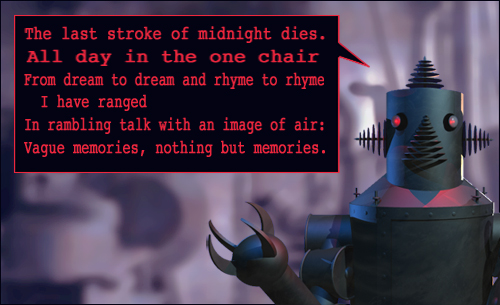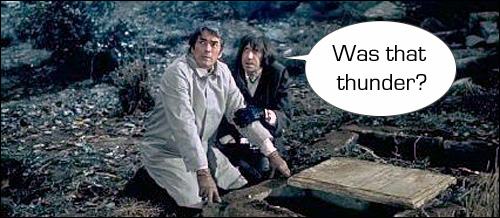Sun 17 May 2009
Zoid Reflects…
Posted by anaglyph under Robots, Zoid
[14] Comments

Thu 14 May 2009
Posted by anaglyph under Creepy, Kooky, Ooky, Spooky
[21] Comments

On my morning bike ride there’s this great house among the glimpses of suburbia that I get from the bush track. It looks so bizarrely out of place among the brick veneer and fake Federation that I can’t imagine what its builders were thinking…
Violet Towne doesn’t quite understand why I’m so enamoured of it, but then she doesn’t see it like I do…
Tue 12 May 2009
Posted by anaglyph under Idiots, Philosophy
1 Comment

I’ve long been fascinated with the concept of the ‘village idiot’, a notion that is so entrenched in our collective psyches that pretty much everybody knows exactly what it means. The concept of the village idiot appears everywhere from Monty Python sketches, to the name of a motorcycle club, to the almost ubiquitous association of the term with George W. Bush in recent times.
I’ll bet that you, like me, thought it was an idea that has somehow made its way to us from medieval times, to take its place in the zeitgeist as a quaint reminder of days of yore, where every village had its idiot and a nicely aimed rotten turnip was not only completely politically correct, but de rigeur.
Turns out that teh internets don’t have much to say on the history of the village idiot at all. The root[tippy title=”*”]Geddit? Root? Turnip?[/tippy] of the idea is somewhat obscure, and the oldest actual reference to it that can be tracked down comes from the preface to George Bernard Shaw’s acerbic Major Barbara, written in 1907.
Before that, nothing. It’s quite surprising really – I was expecting it to be a term rich with history and colour, maybe something featuring in Shakespeare or Chaucer, but it appears that its main activity has been in the near past; the invention of an era almost without villages as such.[tippy title=”†”]Not, however, an era without idiots, needless to say.[/tippy]
So, as we go forward into this age of the Global Village, we will, of course, need to refresh this term. As idiots embrace technology there will undoubtedly be a role for them to fill, and the very least we can do, is offer them the opportunity to do so!
___________________________________________________________________________
*Geddit? Root? Turnip?
†Not, however, an era without idiots, needless to say.
(Photo of the Technological Idiot swiped from the inimitable Dark Roasted Blend)
___________________________________________________________________________
Mon 11 May 2009
Posted by anaglyph under In The News, Robots, Skeptical Thinking, Stupidity, Technology
[18] Comments

Acowlytes! The END IS NIGH! Run for the hills!!! TERMINATORS ARE ALMOST HERE! SkyNet has become self aware and before you can say ‘Hasta la vista baby’, we’ll all be vassals of the Machines!
Yes, this is front page news in this morning’s Melbourne Age. The above breathless gush was headlined as an op ed piece from military futurist Peter W. Singer who speculates that if computers continue to become powerful at the rate that Moore’s Law hypothesizes, by 2030 we will have military robots that carry computing power a billion times their current capabilities.
Of course, a newspaper can’t let it go at that[tippy title=”†”]Because that story is basically: Computer power expands exponentially, so everything that uses computers, including weaponry, will get more powerful. Yawn…[/tippy] Oh, no, no, no! In Newspaper Land science is boring so you have to jazz it up a bit to get the idiots readers interested – that means TERMINATORS! This is what I call ‘Brain-In-a-Jar’ science fiction – the kind of thing that, twenty years from now, will look as goofy as Flash Gordon and 50s images of robots stealing earth women look to us today.
In the article Peter Singer is critical of the Australian Defense Department’s lack of foresight in mentioning robots in a recently released ‘white paper’ outlining Australia’s military strategies for the next couple of decades. You all know how I feel about robots. If they do as well in warfare as they seem to be doing in other areas of deployment, then seriously, we’re well better off without them. Those of you whose skulls aren’t crushed under the treads of the machines in the imminent Northern Hemisphere robot wars can come live here when it’s all over.

___________________________________________________________________________
†Because that story is basically: Computer power expands exponentially, so everything that uses computers, including weaponry, will get more powerful. Yawn…
___________________________________________________________________________
Fri 8 May 2009
Posted by anaglyph under Hokum, Movies, Skeptical Thinking
[33] Comments

Recently over at Nurse Myra’s Gimcrack Hospital, we had cause to discuss the ‘curse’ on the 1976 movie The Omen, starring Gregory Peck & Lee Remick. Numerous movies are affected by such ‘curses’ (Rosemary’s Baby, The Exorcist, Poltergeist and The Crow to name but a few) and it will come as no surprise to you, dear Acowlytes, that about such matters I am highly skeptical. So, as I promised Nurse Myra, today I’m donning my Tsk Tsk Tsk Hat and taking a look at the Omen Curse through my acid-tinted glasses.
Nurse Myra’s jumping off point was an article that appeared in the Sunday Herald that features the point of view of the designer of The Omen, John Richardson, who paints a grim picture of the bad luck surrounding the making of the film.
You can read the Herald’s picturesque account if you want to get the full flavour, but it would take me pages to go into detail, so I’m just going to bullet point the gist of it:
•1: John Richardson and his assistant on the film, Liz Moore were in an horrific car accident in Holland, in which Moore was killed.
•2: Afterwards, Richardson claims that he realised the accident bore uncanny similarities to a death in The Omen, in which actor David Warner is decapitated.
•3: Richardson also saw a road sign at the site of the accident that indicated it was 66.6 miles from the Dutch city of Ommen.
•4: Gregory Peck’s son killed himself two months before the film commenced shooting.
•5: When Peck set off for London to start on his role, his plane was struck by lightning over the Atlantic Ocean.
•6: A plane carrying Omen Executive Producer Mace Neufeld was struck by lightning a few weeks later.
•7: The hotel where Neufeld was staying in London was bombed by the IRA, as was a restaurant where the some of the cast and crew were due to dine on November 12.
•8: Stuntman Alf Joint was injured when a stunt when wrong.
The article goes on to describe how “everyone involved in the production was freaked out to some extent. They all felt that something wasn’t quite right and that included the cast.”
Well, there we have it. The scariest thing in the whole report is the grammar in that last sentence. ((Although I have been on a number of films where we all felt the cast wasn’t quite right, so perhaps that’s what they really meant.))
Even just bullet-pointing the ‘best evidence’ for a curse, rather than using the highly coloured language of the article, throws a sobering light on the collected anecdotes. For the sake of pedantry, though, let’s cast the Cow Eye of Rationality over them and see what we can determine:
•1: From the get-go we’re on shaky ground. The credit list for The Omen reveals that John Richardson was not a designer, as the Herald writer tells us, but is instead listed on the IMDB under Special Effects – an entirely different department. A small point perhaps, but a very good example of how misinformation propagates in these kinds of urban legends. The car accident in question actually happened almost a year after Richardson finished on The Omen, while he was working on A Bridge Too Far. Since Liz Moore is not credited on either film, we must raise an eyebrow on her actual credentials for being ‘cursed’ at all. Is it enough to merely work with someone who has been involved with a cursed film, to bring the curse down on yourself? That would certainly increase the potential victim pool by a substantial order of magnitude.
And even if Moore did work on the film, why did the curse indiscriminately pick on an assistant, rather than go for a head of department? Was it afraid of a fight or something? ((Some reports say Moore was Richardson’s girlfriend, but I haven’te been able to substantiate this. It would make sense.))
•2: Moore’s injuries were identical a to death depicted in the movie, so the legend goes – specifically the untimely end of David Warner’s character, Jennings, who is decapitated by a sliding sheet of glass. Gruesome, for sure, but heck – don’t people know what kind of things happen in car accidents? Vehicle fatalities are one of the most frequent types of non-natural death in the industrial world and decapitation in such situations is certainly not uncommon. And I would be most surprised to find that the victim’s head was severed as cleanly and bloodlessly as that of Jennings in the film (call me skeptical). So what we’re noting is this: while Richardson was working on A Bridge Too Far, a year after he had completed The Omen, an assistant of his, who we can’t actually be sure had even worked on either film, was horribly killed in a car accident, suffering terrible injuries. Um. So how is it that A Bridge Too Far is not cursed? And anyway far from being the victim of a terrible fate, John Richardson is surely lucky to have survived such an awful tragedy!
•3: Richardson says he noted a road sign that indicated the accident happened 66.6 miles from Ommen. Are you detecting a whiff of over-embroidery here, Astute Acowlytes? Distances in Holland are marked in tenths of a mile? With decimal points on the road signs? I’m prepared to be corrected, but I’d find it highly unusual if this is the case. I suspect that if we drilled down into this factoid we’d find that the accident happened ‘about’ sixty-something miles from Ommen, and the 6.6 has somehow crept into the tale for ‘neatness’.
•4: Gregory Peck’s son committed suicide before the film commenced shooting. This happened two months prior to the shoot. Is the curse prescient as well as omniscient? How far before the shoot would the suicide have been acceptably not the work of a curse? How far after? Are all relatives and friends of all the cast and crew susceptible to a filmic curse, with a two month window on either side of a probably 18 month production timescale? Crikey – given the numbers of folk who work on a film, does it strike anyone that it would be incredible for an accident or death not to happen to any of several thousand people over a two year period?
(I’m also prepared to bet that Peck’s son’s suicide didn’t just, like, happen out of the blue. Suicide usually occurs in profoundly unhappy individuals after some deliberation. Indeed, here we learn that:
He (Jonathan Peck) had serious health problems (most of them heart-related), a recent breakup with a girlfriend, and suffocating work conditions (he was working for a local news station which expected him to come up with a certain amount of footage per day, whether there was any news, or not). On top of all this, he had to live up to being the son of Gregory Peck (and here, his astonishing resemblance might have indeed been a drawback). He left no suicide note, but it’s not hard to speculate that the world just became too much for Jonathan to bear.
So not only is the curse responsible for Jonathan Peck’s suicide, it presumably must also be held accountable for his unhappy life…)
•5&6: Planes get struck by lightning. It happens a lot. I’ve been in a plane that was struck by lightning. ((… and it’s totally possible I watched The Omen either two months before or two months afterward… spoooooky!)) It’s generally not a big deal, and rarely results in any problems of any kind. And again, neither of these two events constitutes the outcome of a curse, since both times, exactly nothing happened to all the passengers and crew on the planes concerned.
•7. The cast and crew were affected by IRA bombings in London in 1975. Duh. 1974 and 1975 represented two of the most active years for the IRA intrusions into England, with 7 serious attacks over that time. Famous and wealthy people stay in expensive hotels and eat in exclusive restaurants. The IRA was consistently targeting expensive hotels and exclusive restaurants. There’s a surprise here?
Notwithstanding the fact that no bombings occurred on November 12 as it happens, so that’s another complete error. And in any case no-one was actually bombed anyway! They all escaped being bombed! Surely, once more, that’s good luck as opposed to the gruesome execution of a horrible curse.
And, if we’re going to expand the curse’s powers to include not only bad things happening, but missing out on bad things happening… well, need I elaborate?
•8: A stuntman was injured on a film! HOLD THE FRONT PAGE!
Stunts are dangerous. That’s why they have professionally trained people do them, rather than just throw the lead actor onto a row of metal fence spikes (although sometimes that would be more desirable). I know a few stunt people. They’ve all had accidents of some degree or other. Again, on a film with a lot of stunts (and The Omen had its share) it would be more remarkable not to have had a few accidents.
Now, I can hear your objections already Cowpokes: “Yes, yes, yes, Reverend, that’s all very well, all those things taken as individual items, but what about them all happening in confluence? Surely that’s the evil handiwork of a curse!”
Well, as we’ve seen, about half of those incidents can’t really be considered bad luck as such, because the sum result for those involved was no consequence at all. To the contrary, not being in a restaurant that was bombed is surely the best kind of luck you can have! The remaining unhappy events (all cherry-picked out of hundreds of thousands of possibilities after the fact) can be easily assimilated as the normal flux of daily life mixed with some exaggeration and a little bit of coincidence. All entirely within the realms of natural occurrences.
Movie curses (like other famous ‘curses’ such as the one on the tomb of King Tutankhamen) work on one very simple principle – if you allow your criteria to be stretched to the widest possible extent, you can, with hindsight, find all kinds of seemingly ‘related’ phenomena. Because the ‘logic’ is retro-fitted to the circumstances, anything can be interpreted in a manner that befits the curse.
If we examine the ragtag bunch of ‘facts’ from The Omen curse, one thing is immediately evident – there is nothing at all to relate them to one another. How is the Dutch city of Ommen important in any manner aside from having a name that is similar to the name of the film? What has ‘lightning’ got to do with the ideas behind the film, other than in the loosest possible Wrath-of-God way? How come Gregory Peck’s son and Richardson’s partner were bumped off – what did they do to particularly anger The Omen demons that was more egregious than, say, directing the film, or funding it? What have the IRA, or hotels, or restaurants got to do with anything? All these things are just unrelated events tied together by one common thread – over time, disparate people have come to think they constitute a curse!
Seriously, if I was a demon and I wanted some serious curse action, why would I bother with all this maybe-it-is-maybe-it-isn’t vagueness? It doesn’t speak well for promotion in the demonic workplace. Why wouldn’t I bump off all the principal players and the director and the producers of the film… in the manner of each of the deaths portrayed in the story… on the night of the premiere? Now that would be food for thought!
But like all myths and hooey, there is no logic, no method and, when it comes down to it, no substance of any kind behind The Omen curse. It is just a piece of pop culture mythology spun out of a general queasiness about entertainment meddling with religion. And, dare I be so cynical, something that did no harm at all to the marketing of the film.